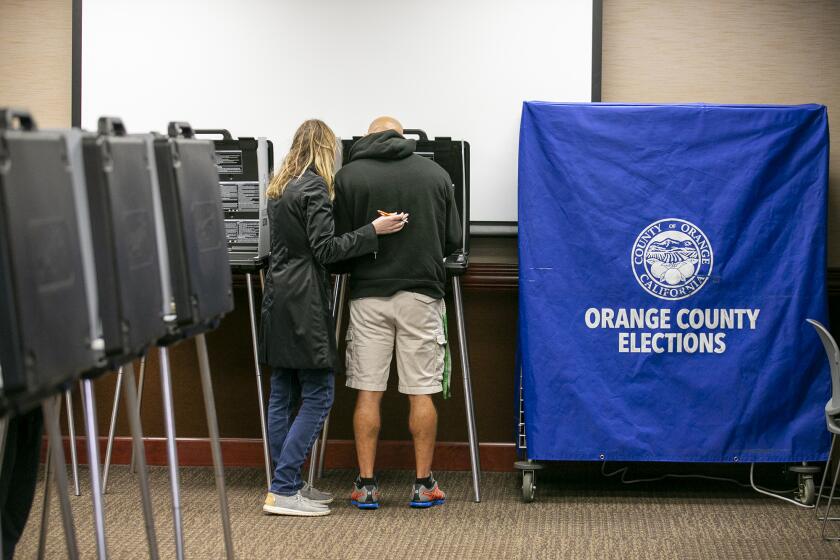Before pro-Israel lobby, Obama defends vision for Mideast peace
Appearing before a pro-Israel audience, President Obama said Sunday the world won’t stand for more delays in forging Middle East peace and reaffirmed his support for an accord based partly on boundary lines in place before Israel made territorial gains in the 1967 war.
There were scattered boos at the gathering of the American Israel Public Affairs Committee when Obama called for borders tracking the 1967 lines, with mutually agreeable land swaps.
Overall, Obama got a polite reception from members of the pro-Israel lobby, with the crowd clapping frequently. But the applause was more spirited when an earlier speaker mentioned that Netanyahu would address the conference on Monday night.
Obama sought to jumpstart a stalled peace process by calling for the Israelis and Palestinians to take part in direct talks leading to two secure, neighboring states.
Obama first invoked the ’67 lines in a major speech on Thursday, sparking fierce criticism from some Republican presidential hopefuls that he was abandoning Israel. That address created an awkward moment in the Oval Office the next day, when visiting Israel Prime Minister Benjamin Netanyahu said the pre-war lines were “indefensible.’’
“What I did on Thursday was to say publicly what has long been acknowledged privately,’’ said Obama, speaking before more than 10,000 at the AIPAC conference. “I have done so because we can’t afford to wait another decade, or another two decades, or another three decades, to achieve peace. The world is moving too fast. The world is moving too fast. The extraordinary challenges facing Israel will only grow. Delay will undermine Israel’s security and the peace that the Israeli people deserve.”
The ’67 boundary lines have been the framework for Middle East negotiations for a decade, though Obama is the first president to publicly pronounce the old map as the basis of a future deal.
Obama said he knew that his remarks last week would prove controversial. Mentioning two of his former politically savvy White House advisors, Rahm Emanuel and David Axelrod, he said: “I know very well that the easy thing to do, particularly for a president preparing for reelection, is to avoid any controversy. I don’t need Rahm to tell me that. I don’t need Axelrod to tell me that. But I said to Prime Minister Netanyahu, I believe that the current situation in the Middle East does not allow for procrastination. I also believe that real friends talk openly and honestly with each other.’’
News reports of his speech Thursday have been misleading, Obama said. The U.S. does not want an Israel with boundary lines mirroring what was in place the day before the Six Day War began in June 1967, Obama said. Land swaps, he said, would accommodate security needs and demographic changes that have taken place over the last 44 years.
In an interview after Obama was done speaking, a White House senior advisor gave some insight into why the president had chosen this moment to lay out a specific formula for a peace accord. The aide, speaking on condition of anonymity, said that talks between the Israelis and Palestinians had foundered in part because “there was no clear foundation for them.’’
“The principles [Obama] described on security and territory can provide a strong foundation for when talks do start,’’ the aide said.
What’s more, Obama’s gambit has the potential to head off a possible Palestinian attempt to gain statehood unilaterally through a direct appeal to the United Nations, the aide said.
“These principles can try to steer the international community away from a unilateral agreement,’’ the aide said.
Obama repeated his assurance that the U.S. won’t forsake Israel, remarks that led to a standing ovation.
He said “the bonds between the United States and Israel are unbreakable, and the commitment of the United States to the security of Israel is ironclad.’’
Not everyone in the audience was reassured. Don Dubin of Philadelphia, a member of AIPAC, said in an interview afterward: “He gave a very good speech. It was disarming, seductive. I don’t know if his heart is in the right place. My concern is that he may fold in a crisis. I don’t think he’s been out front in his support.”
peter.nicholas@latimes.com
More to Read
Get the L.A. Times Politics newsletter
Deeply reported insights into legislation, politics and policy from Sacramento, Washington and beyond. In your inbox three times per week.
You may occasionally receive promotional content from the Los Angeles Times.






